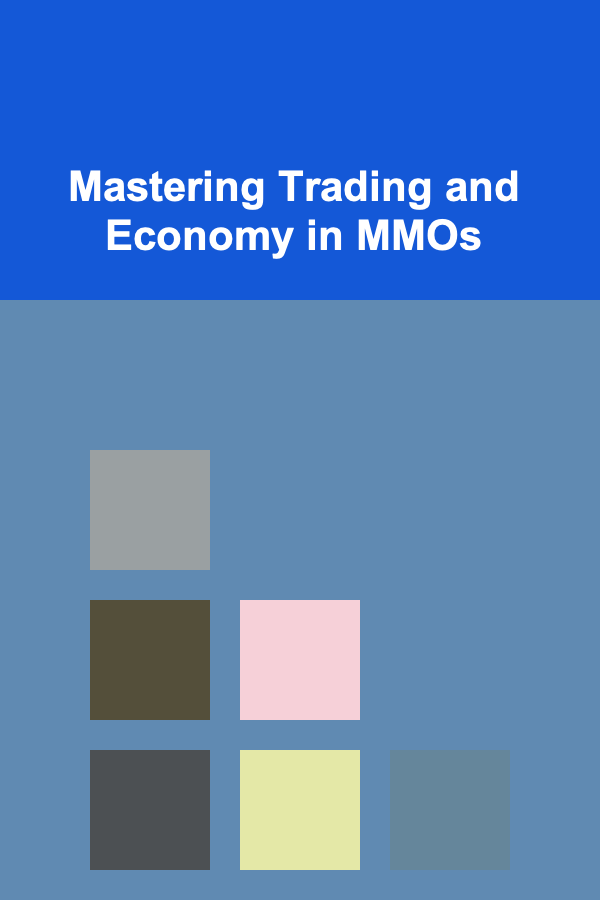
Mastering Trading and Economy in MMOs
ebook include PDF & Audio bundle (Micro Guide)
$12.99$9.99
Limited Time Offer! Order within the next:

Massively Multiplayer Online games (MMOs) offer more than just combat and questing; they present dynamic and complex economies that players can actively participate in and even dominate. Understanding and leveraging the principles of virtual economics within an MMO can dramatically enhance your gaming experience, allowing you to accumulate wealth, acquire powerful items, and ultimately gain a significant advantage over other players. This article delves into the various facets of mastering trading and economy in MMOs, covering essential concepts, strategies, and advanced techniques that can elevate you from a casual player to a virtual tycoon.
Understanding the Fundamentals of MMO Economies
Before diving into specific strategies, it's crucial to grasp the underlying principles that govern MMO economies. These economies, while virtual, often mirror real-world economic concepts, albeit in a simplified and game-controlled environment.
Supply and Demand
The most fundamental principle is the law of supply and demand. The price of an item or service is directly related to its availability (supply) and the desire for it (demand). Items that are abundant and have low demand will have low prices, while rare items with high demand will fetch significant sums. Understanding the factors that influence supply and demand is key to profitable trading.
For example, consider a resource required for crafting a popular piece of armor. If the resource is easily obtainable through a common quest, the supply will be high, and the price will be low. However, if the quest is difficult or time-consuming, the supply will be lower, driving up the price. Similarly, if a new patch introduces a desirable item that requires this resource for crafting, the demand will increase, further increasing the price.
Inflation and Deflation
MMO economies are susceptible to inflation and deflation, just like real-world economies. Inflation occurs when the money supply increases faster than the supply of goods and services, leading to a general increase in prices. This can be caused by various factors, such as:
- Botting: Automated programs (bots) can generate large amounts of in-game currency or resources, injecting them into the economy and devaluing existing currency.
- Easy Currency Generation: If the game makes it too easy to earn money, such as through repetitive quests or farming, inflation can occur.
- Poorly Designed Item Sinks: "Item sinks" are mechanics that remove items from the economy, such as repair costs or crafting ingredients consumed in the process. Insufficient item sinks can lead to an overabundance of items, causing prices to fall.
Deflation, on the other hand, is the opposite -- a decrease in the general price level. This can happen when:
- Currency Removal: Game mechanics that remove currency from the economy, such as high taxes or expensive services, can lead to deflation.
- Increased Item Availability: If a previously rare item becomes easier to obtain, the supply will increase, and the price will fall.
Being aware of inflationary and deflationary trends can help you make informed trading decisions. During inflation, it's generally wise to invest in assets (items or resources) that hold their value or increase in value, rather than holding onto large sums of currency. During deflation, holding onto currency and waiting for prices to drop can be a profitable strategy.
Market Volatility
MMO markets are often volatile, meaning that prices can fluctuate rapidly and unpredictably. This volatility can be caused by a variety of factors, including:
- Patch Releases: New content updates can significantly impact the demand for certain items and resources.
- Player Behavior: Large-scale events, such as coordinated farming efforts or price fixing attempts, can disrupt the market.
- Game Events: Special events or promotions can introduce new items or alter the drop rates of existing items, affecting prices.
- Rumors and Speculation: Even unsubstantiated rumors about upcoming changes can influence player behavior and affect market prices.
Successfully navigating market volatility requires careful observation, analysis, and the ability to react quickly to changing conditions. Staying informed about upcoming game updates and understanding the motivations of other players can give you a competitive edge.
The Role of NPCs (Non-Player Characters)
NPCs play a crucial role in shaping MMO economies. They often act as price anchors, setting fixed prices for certain items or services. Understanding the prices offered by NPCs can help you determine the fair market value of an item and identify potential arbitrage opportunities. NPCs also often offer quests that reward players with currency or items, influencing the overall money supply and item distribution.
Essential Trading Strategies
Once you have a basic understanding of MMO economics, you can start implementing specific trading strategies to generate profit.
Arbitrage
Arbitrage involves exploiting price differences for the same item in different locations or at different times. This can involve buying low in one area and selling high in another, or buying an item when the price is low and selling it when the price increases. Arbitrage opportunities often arise due to regional differences in supply and demand, or due to temporary market fluctuations.
For example, if an item is cheaper in the starting area than in the capital city, you can buy it in the starting area and transport it to the capital city to sell it for a profit. Alternatively, if you anticipate that the price of an item will increase due to an upcoming patch, you can buy it before the patch and sell it after the patch.
Example: In a game with multiple auction houses in different regions, check the price of common crafting materials like 'Iron Ore' in each region. If 'Iron Ore' is significantly cheaper in the newbie zone auction house (due to more new players selling it), buy a large quantity and transport it to a major city where crafters are willing to pay a premium.
Flipping
Flipping is a short-term trading strategy that involves buying an item at a low price and immediately reselling it at a higher price. This strategy relies on identifying items that are undervalued or mispriced. Flipping often involves monitoring the auction house closely and identifying opportunities to buy items below their market value.
For example, you might find someone selling an item for 100 gold that is typically worth 150 gold. You can buy the item for 100 gold and immediately relist it for 145 gold, making a profit of 45 gold (minus auction house fees). Flipping requires quick reflexes and the ability to accurately assess the value of items.
Example: Observe the auction house for gear with desirable stats that are listed at a low price, perhaps because the seller doesn't know its true value or needs quick cash. Buy these items and relist them at a more appropriate price, taking into account the stats and demand for that gear.
Crafting and Selling
Crafting and selling items is a reliable way to generate income in most MMOs. This involves gathering resources, crafting items, and then selling them to other players or NPCs. The profitability of crafting depends on the cost of resources, the difficulty of crafting, and the demand for the crafted items.
To maximize profits, you should focus on crafting items that are in high demand but relatively easy to craft. This might involve researching which items are used in popular builds or required for specific quests. You can also specialize in crafting rare or difficult-to-obtain items that command a premium price.
Example: Identify a gear slot that's commonly upgraded by players in the mid-game. Focus on leveling the crafting skill needed to create gear for that slot, and then sell your crafted items on the auction house. Pay attention to which stats are most desirable for that gear slot and craft accordingly.
Resource Gathering
Resource gathering involves collecting raw materials from the game world, such as ores, herbs, or wood. These resources are used for crafting, alchemy, and other professions. Resource gathering can be a profitable activity, especially if you focus on gathering rare or high-demand resources. The profitability of resource gathering depends on the drop rates of resources, the competition for resources, and the market price of resources.
To maximize profits, you should identify the best locations for gathering specific resources and optimize your gathering techniques. This might involve using special tools or skills to increase your gathering speed or yield. You can also cooperate with other players to share information about resource locations and reduce competition.
Example: Learn the optimal routes for farming valuable herbs or ores in a specific zone. Consider using in-game maps or online guides to find areas with high resource spawn rates. You can also specialize in gathering rare resources that are required for high-level crafting.
Market Manipulation (Proceed with Caution)
Market manipulation involves attempting to influence the market price of an item or resource. This can involve buying up a large supply of an item to artificially inflate its price, or spreading false information to create panic selling. Market manipulation is a risky strategy that can backfire if you are not careful. It can also be considered unethical or even against the game's terms of service in some cases. Proceed with extreme caution and understand the potential consequences before attempting market manipulation.
Example: Identify an essential crafting material with a relatively low volume on the auction house. Slowly buy up a significant portion of the available supply. Once you control a large share of the market, you can gradually increase the price, knowing that crafters will be forced to buy from you. However, be aware that other players might notice your activity and attempt to undercut you or find alternative sources of the material.
Advanced Techniques for Economic Mastery
Beyond the basic strategies, several advanced techniques can further enhance your trading prowess in MMOs.
Market Analysis and Tracking
Successful traders are diligent market analysts. This involves:
- Tracking Price History: Maintain records of item prices over time to identify trends and predict future fluctuations. Spreadsheets or dedicated market analysis tools can be invaluable.
- Monitoring Volume: Track the volume of items being traded to gauge demand and liquidity. High volume indicates strong demand and easier selling.
- Analyzing Competition: Observe the behavior of other traders, identifying their strategies and pricing patterns.
- Staying Informed: Follow game forums, patch notes, and community discussions to stay abreast of any changes that could affect the market.
Tools: Some games have API that allow you to pull market data. If not available, carefully designed manual spreadsheets will be necessary to track data trends.
Understanding Player Psychology
MMO economies are driven by player behavior, which is often influenced by psychological factors. Understanding these factors can give you a significant advantage in trading.
- Fear of Missing Out (FOMO): Players are often willing to pay a premium for items that are perceived as rare or limited-time offers.
- Loss Aversion: Players are more sensitive to losses than to gains, meaning that they are more likely to hold onto an item that has decreased in value than to sell it at a loss.
- Herd Mentality: Players often follow the crowd, buying items that are popular or hyped, even if they are not necessarily the best value.
By understanding these psychological biases, you can anticipate player behavior and make more informed trading decisions. For example, you might buy up a supply of an item that is about to become a limited-time offer, knowing that the price will likely increase due to FOMO.
Leveraging Information Asymmetry
Information asymmetry refers to the unequal distribution of information among market participants. Traders who have access to more information than others have a significant advantage. This information might include:
- Insider Knowledge: Information about upcoming game changes or unannounced events. This type of information is often difficult to obtain, but it can be extremely valuable.
- Hidden Information: Knowledge about hidden item stats or undocumented game mechanics. This information can be obtained through careful experimentation or by analyzing game data.
- Early Access: Access to beta servers or early releases of new content. This allows you to gain a head start in identifying profitable trading opportunities.
By leveraging information asymmetry, you can make trading decisions that others are not able to make, giving you a competitive edge.
Optimizing Auction House Presence
The auction house is the primary marketplace in most MMOs, and optimizing your presence there is crucial for successful trading.
- Undercutting: Consistently undercut your competitors by a small margin to ensure that your items are listed at the lowest price. However, be careful not to engage in a price war that drives down prices for everyone.
- Quantity Management: List items in appropriate quantities to maximize sales. Smaller quantities are often better for fast-moving items, while larger quantities are better for slower-moving items.
- Timing: List items at optimal times to reach the largest audience. Consider when most players are online and actively using the auction house.
- Presentation: Write clear and concise descriptions for your items, highlighting their key features and benefits.
Example: Learn the prime time hours for your server's auction house. List your goods shortly before these hours to capture the most potential buyers.
Building a Network
Trading in MMOs is not always a solitary activity. Building a network of contacts can provide valuable information, resources, and support.
- Joining Guilds: Guilds often have internal economies and trading networks that can provide access to exclusive items or resources.
- Forming Alliances: Cooperate with other traders to share information, coordinate trading strategies, and reduce competition.
- Developing Relationships: Build relationships with key NPCs or influential players who can provide valuable information or assistance.
Ethical Considerations
While mastering the economy can be rewarding, it's important to consider the ethical implications of your actions. Avoid engaging in activities that exploit other players or disrupt the game's economy. Examples of unethical behavior include:
- Botting: Using automated programs to generate currency or resources.
- Scamming: Deceiving other players to obtain their items or currency.
- Price Fixing: Colluding with other players to artificially inflate prices.
- Exploiting Glitches: Using game bugs or exploits to gain an unfair advantage.
Adhering to ethical principles will not only maintain a positive reputation but also contribute to a healthier and more enjoyable gaming environment for everyone.
Conclusion
Mastering trading and economy in MMOs is a challenging but rewarding endeavor. By understanding the fundamentals of virtual economics, implementing effective trading strategies, and leveraging advanced techniques, you can accumulate wealth, acquire powerful items, and gain a significant advantage over other players. Remember to stay informed, adapt to changing market conditions, and always act ethically. With dedication and perseverance, you can become a true economic powerhouse in your chosen MMO, transforming your gameplay from a simple adventure into a sophisticated economic simulation.

How to Teach Kids the Importance of Organization
Read More
How To Understand Relational Databases vs. NoSQL
Read More
How to Use Spreadsheets to Stay Organized Throughout Wedding Planning
Read More
How to Play the Zither: Folk Melodies
Read More
How to Develop a Mindful Approach to Sleep
Read More
Understanding Blockchain in Supply Chain Finance
Read MoreOther Products

How to Teach Kids the Importance of Organization
Read More
How To Understand Relational Databases vs. NoSQL
Read More
How to Use Spreadsheets to Stay Organized Throughout Wedding Planning
Read More
How to Play the Zither: Folk Melodies
Read More
How to Develop a Mindful Approach to Sleep
Read More